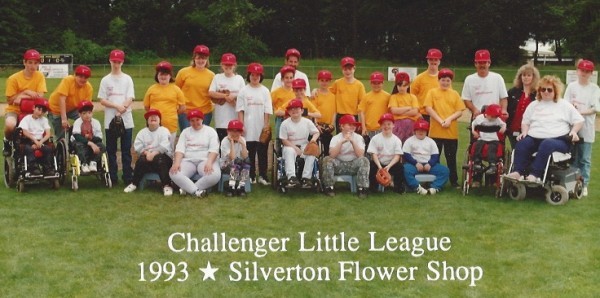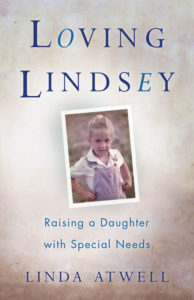Recently I read a blog post where the parent did not want her child identified as special needs. She wanted her child to be treated like a typical kid. Yet–from the stories told–this child didn’t act typical.
Growing up, my daughter often acted out. I experienced one embarrassing moment after another. Once Lindsey yelled an inappropriate comment in a store, making a wild and crazy scene. Customers looked in our direction and scowled. I overheard someone say, “Can’t that mother control her daughter?” An old man turned to his adult son and said, “What that girl needs is a spanking.”
I wanted to crawl in a hole or runaway and hide. I wanted to drag my kicking and screaming ten-year-old from the store. I wanted to shake my fists (at the world, at God, at my child) and shout, “She has a disability!”
With all the discussions around labeling, I wonder, why the discontent?
Is it wrong to call a deaf person hearing impaired? Without the label, wouldn’t we shout louder and louder, wondering why he didn’t respond? When you walk down the street, if you see a person with a different skin color, don’t you mentally identify that person as black or white or Japanese or Hispanic?
In our hometown, we have a community of Russian families. The women wear long, bright colored dresses. They wrap their hair with scarves. The older men grow beards, honoring the covenant to never cut their facial hair. Members purposely (and with pride) do these things to identify themselves as Russian. So I don’t understand the resistance to applying an appropriate and accurate identifying label to children with special needs.
I’m not what you would call “competitive” when it comes to sports. My daughter and son played T-ball In the 80s. I was thrilled when every single player received a shiny gold trophy at the end of the season–no matter what his/her contribution to the team. Now these T-ballers have entered the work force. Managers have found it difficult to motivate this new influx of employees–they all want a trophy at the end of the day–no matter how much effort they put forth. But kids are not all the same. And the efforts they put forth aren’t all the same either. Could not labeling be as (or more) detrimental than labeling?

For some reason, it has never bothered me to refer to my daughter as “special needs.” For years, I searched for a title, a label, something to describe her disability. She didn’t look mentally challenged–and people didn’t treat her that way. Yet when Lindsey didn’t respond the way other kids her age did, adults thought her to be defiant. (In some cases that was true.) I often found myself explaining Lindsey’s actions, inactions, reactions. I held her accountable for unacceptable behaviors because, although my love for her was unconditional, I wanted other people to love (or at least like) her too. I wanted other children (to want) to play with her.
My daughter has not always been easy to love. She grabbed dolls out of Maria’s hands, she stomped on Tony’s foot, she pinched her brother. These may have been normal childhood behaviors, (but at ten? Twelve? Fourteen?) I felt that if she wanted friends, she needed to be a friend. Because of her slow-to-develop reasoning skills, we were rarely successful in the friend arena. She just couldn’t master friendship. A few kids attempted kindness and invited her to a birthday party or to play a game. But most kids drifted away–into a crowd of youngsters who played nicer, better. And even though it broke my heart, I didn’t blame them. (I continued to coach my daughter, but she never fully comprehended proper play tactics like her mentally typical brother.)
Within the school system, I was desperate for an appropriate description for my daughter’s disability. In my mind, a clearer label might have helped a teacher find the key that would unlock the wonders trapped in my little girl’s mind. I wanted her to learn, graduate from high school, go to college, and move away from home–like other kids. I wanted Lindsey to become a contributing member of society. If she had a label: dyslexic, autistic, or anything other than mildly mentally retarded from an unidentifiable syndrome–I would have jumped for joy. Instead, I wrestled with jealousy when I saw a Down syndrome boy and his one-on-one aid. Because of the shape of his eye, he’d been easily identified. When I learned that his parents attended support groups, my envy raged green.
All children should be seen as children first. But if a label clarifies why our sons or daughters act (or don’t act) a certain way–doesn’t that give the mother on the playground some information to sympathize, empathize, maybe even discuss the situation with her child so he/she could learn to be tolerant and kind? If a label helps an educator provide better instruction for our children–isn’t a label better than trying to pretend our kids are “normal” or typical? Are we parents overly touchy about this subject?
I realize that a wrong label could hurt a kid. I’m not talking about a misdiagnosis. But I’ve met parents who refuse to acknowledge that their child is struggling, is different…that he/she needs additional help-as if the disability isn’t acknowledged, it won’t be real, or that the son/daughter will outgrow his/her challenges.
“Maturity! That is all my child needs!” one father told me. Sometimes, I think it is more of the parents hang-up than it is the child’s.
I’m a contradictory woman. I like beneficial labels, but not the ugly ones. And I’m sure some parent can site an incident when a mis-label or diagnosis was hurtful. All I know is that my daughter is now thirty-two years old. A mentally challenged label eventually earned Lindsey an IEP (Individual Education Program) within the educational system. She received special instruction and services in grade, junior high, and high school. She graduated with a certificate of attendance. She works two hours a day in a local insurance office, and she recently married her long-time boyfriend. She lives an independent life with the help of social services, like food stamps. She receives Social Security benefits. Until recently, she took advantage of subsidized housing–all because of her government-recognized disability. My daughter knows she is different–it is not a secret. A lot of her issues have no logical, scientific basis, i.e. doctors cannot pinpoint a specific source for her neurological challenges.
“My disability?” Lindsey recently explained to our pharmacist, “it’s all in my head.”
Her statement is true in so many ways.
When Lindsey was initially diagnosed, the painful terminology crippled me for a short time. But I eventually healed. I wanted every dream for my daughter that could be expected for any other kid. Some of the things I desired ended up being unrealistic. Other’s weren’t. But we were brave enough to accept the label. And although things are not perfect, Lindsey is thriving in her imperfect world.
 My first book, Loving Lindsey: Raising a Daughter with Special Needs will be out September 26, 2017. If you would like to learn more, click here.
My first book, Loving Lindsey: Raising a Daughter with Special Needs will be out September 26, 2017. If you would like to learn more, click here.

